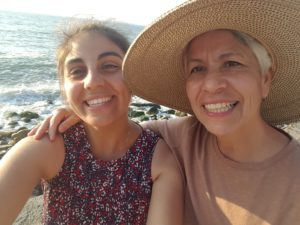
Meet an Ambassador
The Rivkin Center for Ovarian Cancer’s Education program provides free health education workshops across the west coast. Rivkin education campus ambassadors are the feet-on-the-ground representatives at colleges for the Rivkin Center, helping set up workshops, identify opportunities to reach more students, and so much more.
Say hello to Izzy Shahmirza, CanCan ambassador at the University of California, Los Angeles.
About Izzy
Where are you from? Santa Cruz, California
Where do you live now and what does a typical day look like for you? I currently live in Los Angeles and am attending UCLA! I wake up on a sunny LA day, attend my classes, either go to my research lab, continue to help plan Relay for Life at UCLA, or reach out to different organizations on campus to host a Rivkin Edu party! I also make sure to get some exercise — either playing in an Intramural basketball game, going to the gym, or going for a swim. I also TRY to cook myself dinner — cooking is still a work in progress:)
What do you do for fun? I love to play basketball, spend time with my friends and family, hike in the outdoors, and go to the beach!
What is your favorite mantra? Let go and let God:)
What is your favorite drink? Thai Tea Boba
What advice would you give to your younger self? To live in the moment more, to not worry about the future and to not hold onto the past — to always live life to the fullest through passion!
What are you most proud of? One of my proudest moments was when I found out that I got into UCLA. But, I also am proud to be discovering what I am passionate about and being able to live out those passions.
Where has been your favorite place to travel? Mexico:)
What is one thing people would be surprised to know about you? I am half Mexican and half Persian.
Where do you go to find inspiration? I either talk to my parents to find inspiration, go find it in nature, or through my Catholic faith.
Where’s your happy place? With my parents and close friends, anywhere in nature, or in Mexico!
Who is your role model? Mom and Dad:)
How Izzy got involved
What inspired you to get involved with Rivkin Edu? My mom is my main inspiration to why I have a passion for serving those who have cancer. My mom is an Oncology nurse and she works so unbelievably hard to care for her patients! I also have many family members and friends who have battled cancer, so I wanted to be a part of an empowering organization in which we go out to teach others about the importance of taking one’s health into their own hands; to become advocates for their health, and to learn the severity of cancer and the effects it has on patients as well as on family members and friends.
What is your favorite memory from a Rivkin Edu party? When Gail or Lauren, UCLA’s survivor, and educator, share their personal cancer stories; they are inspirations to all the attendees! I know personally, I feel a sense of empowerment — hearing their stories only motivates me to work harder to help those who have cancer and strive to create a cancer-free world.
How can people help support someone going through cancer? To be present for them. To let the cancer patient know that they are there for them, to support them, and encourage them to keep fighting. I also think a cancer patient does not need to be reminded that they have cancer, therefore, people can be themselves, not act completely different because their friend or a family member has cancer. People need to remain hopeful, positive, and a light for cancer patients and cancer patients also need to strive to be hopeful, positive, and a light.
What is the most important thing you want attendees to learn at a Rivkin Edu party? I want attendees to not only learn about breast and ovarian cancer (the symptoms, the treatments, the effects these cancers have on the body), but I also want attendees to become advocates for their own health; to learn about what is normal about their bodies and what is abnormal. I also want attendees to leave the parties feeling empowered to go share the knowledge they have gained with friends and families so more and more people learn the importance of taking care of one’s health and becoming advocates for one’s health.
How many Rivkin Edu parties have you hosted/attended? We have hosted 6 parties so far, with two more on the way!
How many total attendees have you hosted? We have hosted at least 100, or close to 100, attendees since February 2018.
Do you have any events coming up? Yes! We have a Rivkin Edu Party on Wednesday, May 16th! With more to come as well:)
Learn more about the CanCan program
Want to learn more about becoming a campus ambassador? Apply here.

